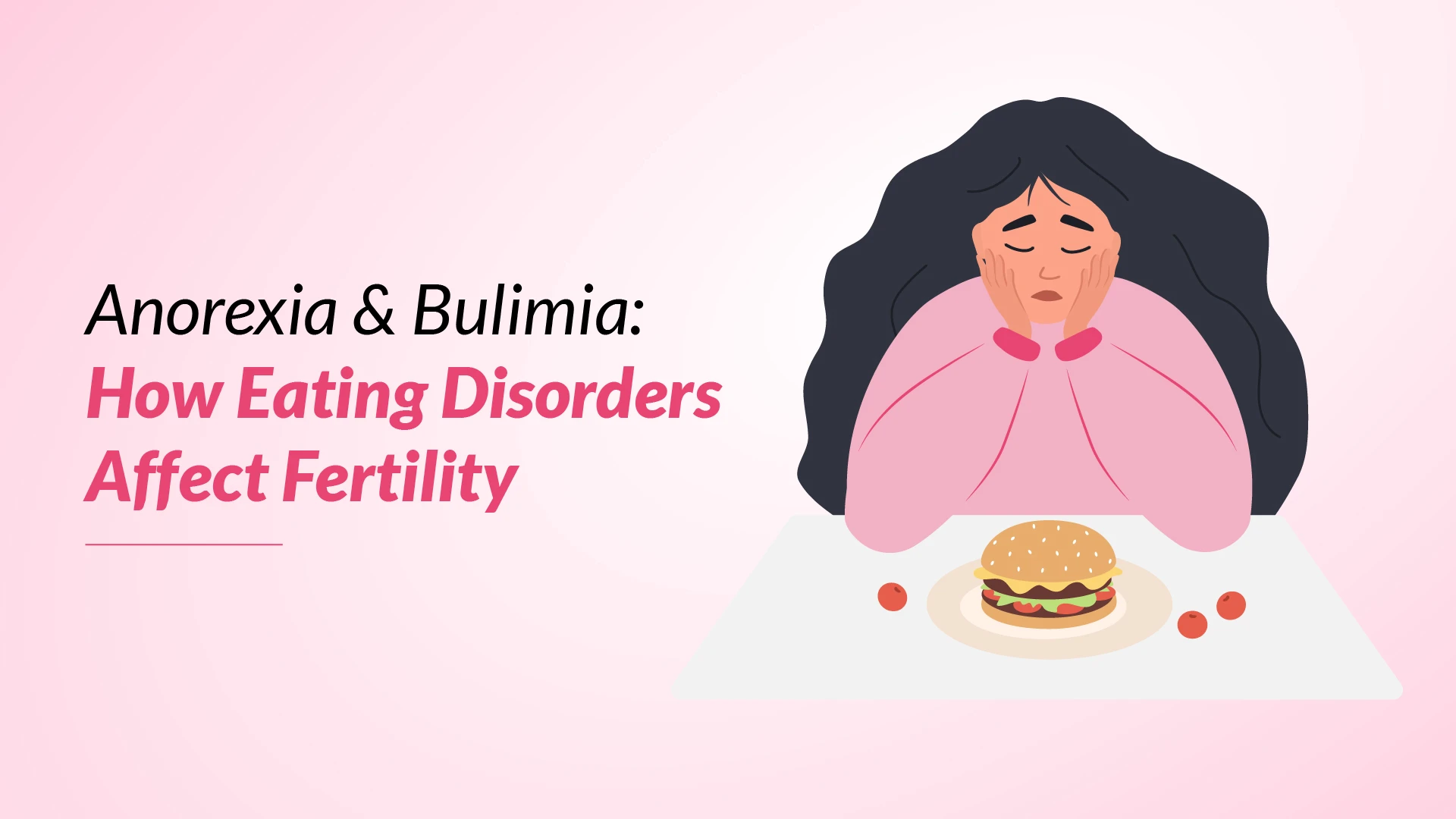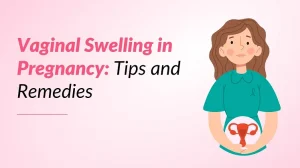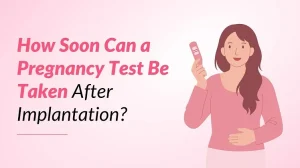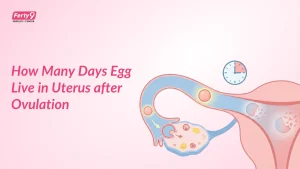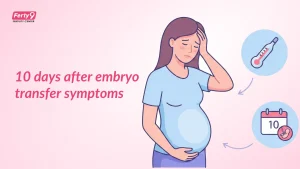Do eating disorders cause infertility? This crucial question resonates with many individuals facing reproductive health challenges. Eating disorders, such as anorexia and bulimia, pose serious risks not only to your overall health but also to your fertility. Research indicates that anorexia nervosa has a lifetime prevalence of 0.6% in adults, and many individuals facing this condition may encounter significant fertility challenges as a result. However, there is hope—by understanding the relationship between eating disorders and fertility, individuals can seek timely treatment to restore their reproductive health.
Also read: Trying To Conceive Tips from Experts
What is Eating Disorder?
It is a mental health illness characterized by inappropriate eating habits and an obsession with body weight or shape. Common eating disorders include:
- Anorexia nervosa: It is characterized by an intense fear of gaining weight, leading to severe restrictions in food intake. Individuals with anorexia usually see themselves as overweight, even when they are dangerously underweight.
- Bulimia nervosa: It involves cycles of binge eating followed by compensatory behaviors such as excessive physical exercise or vomiting. People with bulimia usually feel a loss of control during binge episodes and then experience guilt or shame.
These behaviors not only affect physical health but can also disrupt the body’s reproductive system, leading to fertility problems.
The Impact of Eating Disorders on Reproductive Health
Let’s explore how eating disorders can deeply affect your reproductive health and fertility potential.
Fertility Issues in Anorexia Nervosa
Individuals with anorexia nervosa often experience:
- Amenorrhea: A significant reduction in body fat can lead to missed menstrual periods, making ovulation impossible. Without ovulation, conception cannot occur, contributing to underweight and infertility.
- Delayed Puberty: For adolescents, anorexia can delay the onset of menstruation and lead to underdeveloped reproductive organs.
- Pregnancy Complications: Even after recovering from anorexia, the risks remain. Women who have struggled with this disorder may face complications during pregnancy, including:
- Higher risk of miscarriage
- Preterm labor
- Low birth weight
- Bone Health Issues: Anorexia can lead to reduced bone density, which results in an increased risk of osteoporosis and fractures. This deterioration in bone health can complicate pregnancy and recovery postpartum, affecting overall reproductive health.
Suggested Read: Know About High-Risk Pregnancy
Fertility Issues in Bulimia Nervosa
The cycles of binge eating due to bulimia nervosa can lead to significant weight fluctuations, resulting in being overweight and infertility. For those with bulimia, fertility can also be affected in several ways:
- Irregular Menstrual Cycles: Bingeing and purging disrupt hormonal balance, leading to irregular or absent periods.
- Nutritional Deficiencies: Frequent purging can result in significant nutrient loss, affecting overall health and the body’s ability to support a pregnancy.
- Increased Risk of Miscarriage: Women with bulimia who become pregnant may face a higher risk of miscarriage due to the physical stress on their bodies and the nutritional deficiencies that can arise from their eating disorders.
- Sperm Quality: In male partners of those with bulimia, poor nutrition and health can lead to decreased sperm quality, impacting fertility.
- Impact on Fetal Development: If pregnancy occurs, the health of the fetus may be compromised. Nutritional deficiencies can affect fetal growth and development, leading to potential long-term health issues for the child.
Suggested read: Can Losing Weight Increase Your Chances of Getting Pregnant?
Hormonal Imbalances Caused by Eating Disorders
Eating disorders can cause serious hormonal imbalances, which are critical for reproductive health.
- Estrogen Levels: Anorexia and estrogen levels are closely related in women. Anorexia can cause a drop in estrogen levels, impacting ovulation and menstrual cycles. Low estrogen is often associated with infertility.
- Insulin and Other Hormones: Bulimia can disrupt insulin levels and other hormones necessary for reproduction. This imbalance can complicate the body’s ability to regulate menstrual cycles and ovulation.
- Prolactin Levels: Anorexia can also elevate prolactin levels, which can inhibit ovulation and further diminish fertility potential. Women with anorexia may wonder, “Can anorexia cause permanent infertility?” While recovery is possible, prolonged periods of disordered eating can result in lasting effects on reproductive health.
- Progesterone Levels: Binge eating in bulimia can interfere with progesterone levels, which are crucial for preparing the uterine lining for a potential pregnancy. Low progesterone can lead to difficulties in sustaining a pregnancy, making it challenging for individuals struggling with bulimia to conceive.
Addressing these hormonal issues is vital for restoring fertility.
Treatment and Recovery: Restoring Fertility
Restoring fertility after an eating disorder involves a comprehensive approach that addresses physical and psychological health. Treatment typically includes nutritional counseling to help individuals achieve a healthy weight and restore normal eating patterns.
Reestablishing a healthy weight can lead to improved anorexia and fertility, as balanced nutrition aids in regulating hormone levels. In many cases, individuals may experience the return of regular menstrual cycles and improved chances of conception following recovery. However, it’s essential to recognize that recovery is a process and may take time.
In some cases, medical treatments like hormone therapy or fertility medications may be necessary to stimulate ovulation. For those concerned about the long-term effects of anorexia, it’s vital to consult healthcare providers to understand the potential implications for future fertility.
Psychological Support and Counseling
Eating disorders do not exist in isolation; they are often intertwined with mental health issues. Conditions like anxiety and depression can both contribute to and result from eating disorders. This connection creates a cycle that can be hard to break, further complicating the ability to conceive.
Psychological support is important for individuals recovering from eating disorders.
- Therapy: Therapy can help address the underlying problems contributing to disordered eating and provide coping strategies for managing stress and anxiety related to body image and weight.
- Family Support: Involving family members in the recovery process might create a supportive environment that fosters healing and encourages healthy behaviors.
- Support Groups: Try to connect with others who have similar experiences as you; it is vital for recovery, as they can provide a sense of community and understanding.
- Counseling: Counseling can also help individuals set realistic goals for weight gain and emotional well-being, paving the way for improved reproductive health.
Addressing the psychological factors of eating disorders is as important as treating the physical symptoms, especially when it comes to fertility.
Conclusion
Eating disorders like anorexia and bulimia have significant impacts on reproductive health and fertility. Understanding these effects is crucial for anyone affected by these conditions. Recovery is possible with the right treatment and support, and it is essential to address the physical and psychological components of these disorders. If you or somebody you know is struggling with an eating disorder and concerned about fertility, reaching out to experts like Ferty9 Fertility Center can be the first step toward a healthier future and the possibility of starting a family.








